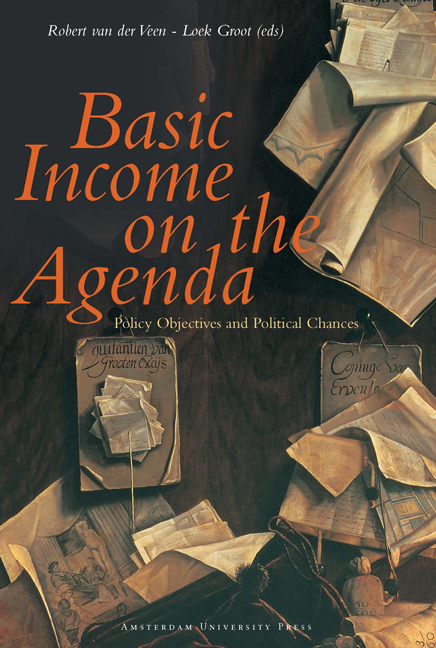Preface
Published online by Cambridge University Press: 23 January 2021
Summary
Throughout Europe, the idea of an unconditional basic income has been long discussed by academics, policymakers, and interest groups such as the unemployed, religious organizations, environmentalists and trade unions. Contemporary issues to which these debates relate today include unemployment, poverty, marginalization, changing patterns of family life, labour market flexibility, and institutional questions concerning the future of social policy under European integration. In Arguing for Basic Income (1992), edited by Philippe Van Parijs, the ethical foundations for granting everyone a fully unconditional subsistence income were explored in depth. The present volume follows this up by examining basic income in relation to concrete objectives of social and labour market policy (Part I), and looking at its political chances across European countries (Part II). This may be taken to reflect the fact that the international debate on basic income has become politically mature in the intervening years.
What, then, can reasonably be thought of the title of the book: Basic income on the agenda? An ambitious reading might suggest that basic income, or the closely related negative income tax, is now firmly on the legislative agenda, ready to replace the meanstested and work-related forms of guaranteed income in European welfare states. As the contributions of Part II will show, basic income is not on the agenda in that sense, at least not in any European country, at the beginning of this century. But while the fortunes of the proposal depend on contingent circumstances and fluctuations in political mood, the general outline of the debate is more or less similar everywhere. It is a debate which is not likely to subside. Consequently, basic income is indeed on the agenda of welfare state politics.
The challenge posed by basic income rests in its claim that unconditional guarantees have now become indispensable elements of social policy. They are said to cope more efficiently with the uncertainties of increasingly flexible labour markets, and avoid the administrative and incentive pitfalls of means-testing. They are held to provide means of job transition and retooling of labour capacity, as well as supporting unpaid activities in the domestic sphere and the associations of civil society, thereby also contributing to a more equitable redescription of gender roles. However, as proposals to institute unconditional income of one kind or another become more realistic, they also tend to mobilize opposition.
- Type
- Chapter
- Information
- Basic Income on the AgendaPolicy Objectives and Political Chances, pp. 7 - 10Publisher: Amsterdam University PressPrint publication year: 2000



